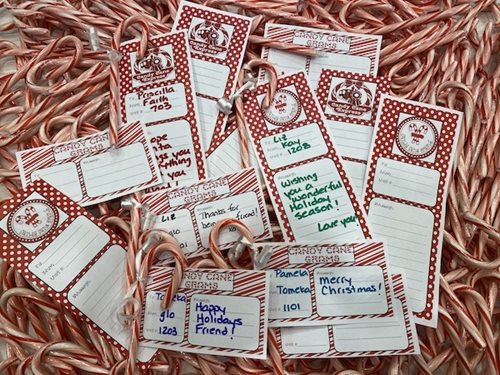Keeping the community connected is tough right now. But Alamo Community Group is always looking for new ways to do it. They're looking even more as the holidays approach. One afternoon, during a Zoom meeting, a staff member recalled the days of sending "candygrams" in school. You'd pay a dollar, and someone would deliver a candy bar across the cafeteria to a friend or crush.
"We have 1,300 units in 10 different communities," says Tina Aranda, deputy director of Alamo Community Group. "We wanted to cover as many people as we could." So they decided to adapt the idea and send "candy-cane-grams." They're also sending templates to residents so they can send candy-cane-grams to each other. The candy-cane-grams will be free, and Aranda notes that the activity could easily be repeated in other communities and neighborhoods – as long as you buy enough candy canes. Aranda planned on buying at least 1,300.
 Residents will be able to sign their names to a pre-written message or draft their own. Staff will deliver the notes with the candy canes. That will also give them a chance to check in on residents, especially seniors. As the pandemic continues, Aranda says her staff has worried about the isolation of residents.
Residents will be able to sign their names to a pre-written message or draft their own. Staff will deliver the notes with the candy canes. That will also give them a chance to check in on residents, especially seniors. As the pandemic continues, Aranda says her staff has worried about the isolation of residents.
Many other NeighborWorks organizations also work to curb isolation. That's one reason NeighborWorks America offered a toolkit to help people stay connected.
"This is the first time we're trying it," Aranda says of the candy-cane-grams. "We're trying to be really creative this holiday season. We know folks are suffering from isolation and not getting to see family or extended family." They're not able to visit with one another, either, the way they used to. Aranda says people in her community are used to socializing every month. She says staff is always listening for ideas they can try. She encourages others to do the same.
"Think out of the box and try some different things," she says. In her own community, many of the residents don't use computer technology, so dropping a note the old-fashioned way seemed like the way to go.
"We're eager to see what we can do to make sure folks are engaged somehow," she says. "We're always looking for an opportunity to try something different. It's exciting to get something at your door if you're not expecting it."
The organization also held a decorating contest, as they've done in years past. "I won first prize," says Katherine Price, a resident in Kirby, Texas. "A hundred dollars off my rent!" Price decorated the area outside her apartment with a reindeer, sleigh, and boxes of presents. A senior who lives on her own, Price says she appreciates all Alamo Community Group continues to do to connect residents.
"Before the pandemic, we'd have picnics and cakewalks and a dancing contest," she says. "We don't do as much as we used to, but we stay connected." And that is meaningful, she adds.
Willie Johnson, a senior living in an Alamo community in San Antonio, says the learning center is the part of her building she's always appreciated the most. "It's our biggest asset," she says, and provides activities and help for people of all ages. While the doors are closed, she can still make an appointment if she needs technical help – something her son doesn't always have the patience for, she says with a laugh. "I tell him it took me two years to teach him to tie his shoes."
She recently asked a staff member to help her with her phone and to help her find cheaper internet service. There's also a food pantry, and staff let senior residents know when they can pick up their food items.
"I was very depressed and sad when they first put us on the lockdown," she says. "But I found other things to do. I have a little garden. And they're trying to find information on getting us that vaccine."
Games, phone call and candy canes – all serve to make the holidays a little sweeter. Other NeighborWorks organizations can replicate the activities, as can individual families and friend groups. "As needs fluctuate and change, we continue to push forward," Aranda says.
Further reading: A NeighborWorks organization lights up the holidays.
12/18/2020

